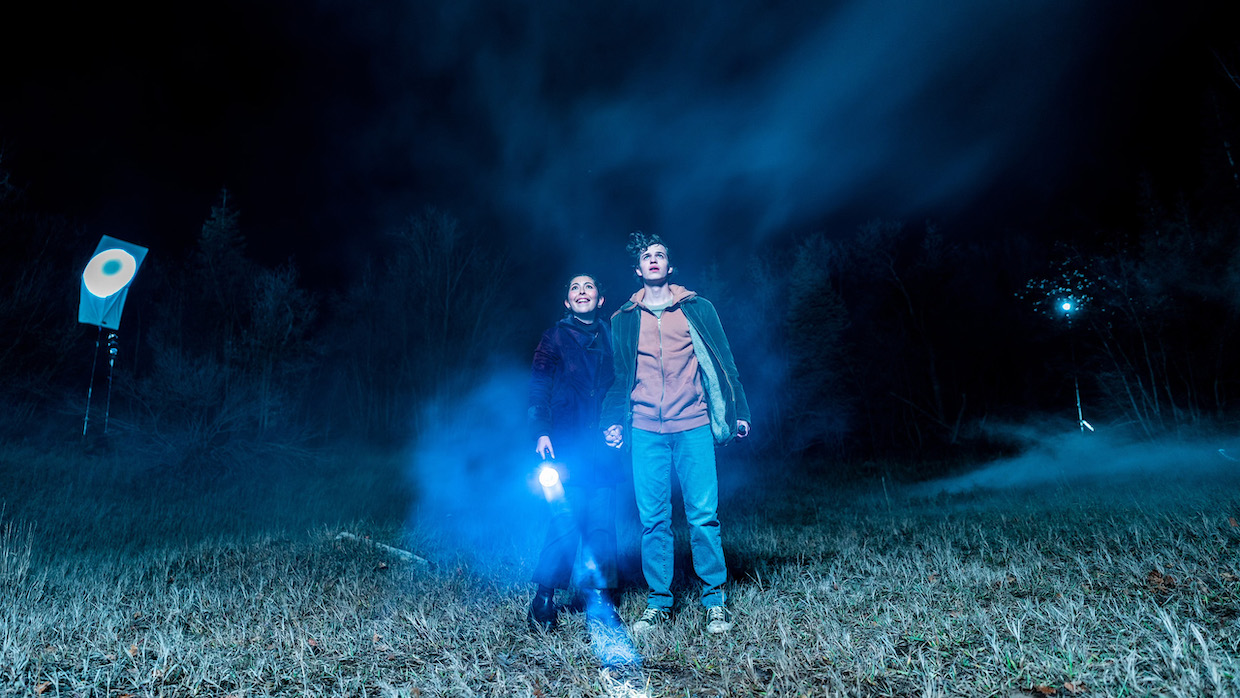 Back to selection
Back to selection
“I Love To Look For Good Reactions”: Editor Whitney Houser on Aliens Abducted My Parents and Now I Feel Kinda Left Out
 Aliens Abducted My Parents and Now I Feel Kinda Left Out, courtesy of Sundance Institute.
Aliens Abducted My Parents and Now I Feel Kinda Left Out, courtesy of Sundance Institute. In Jake Van Wagoner’s Aliens Abducted My Parents and Now I Feel Kinda Left Out, new kid in town Itsy (Emma Tremblay) befriends her neighbor Calvin (Jacob Buster) who harbors a strange suspicion. Obsessed with the cosmos, he constantly gazes at the stars and hopes that an alien spaceship that he believes abducted his parents will return to beam him up as well.
Editor Whitney Houser discusses cutting the film, which premiered in Sundance’s Kids section.
See all responses to our annual Sundance editor interviews here.
Filmmaker: How and why did you wind up being the editor of your film? What were the factors and attributes that led to your being hired for this job?
Houser: A lot of it was timing. I was wrapping up working on a different project with the director Jake Van Wagoner when he mentioned this movie he was about to direct. It took me a few days to work up the courage to ask him if I could edit the film. I was blown away when he said he wanted me to do it. It was my first feature film so he really took a chance on me. I’m grateful he did because it was such a fun experience.
A big factor that helped me get this film was my history with Jake. We worked on a lot of comedy together and built a lot of trust over time. I think he knows I’ll do everything I can to uphold his creative vision and make something as entertaining as possible.
Filmmaker: In terms of advancing your film from its earliest assembly to your final cut, what were your goals as an editor? What elements of the film did you want to enhance, or preserve, or tease out or totally reshape?
Houser: My main goal was to hit the emotional tone of every scene. I want the audience to connect to what each character is going through in a particular moment.
Filmmaker: How did you achieve these goals? What types of editing techniques, or processes, or feedback screenings allowed this work to occur?
Houser: I love to look for good reactions. A lot of times, the character listening is a lot more important than the character talking. So I would watch a scene down and mark those little moments actors will give you that help support the emotion of the story. It might be my favorite part of the job.
Filmmaker: As an editor, how did you come up in the business, and what influences have affected your work?
Houser: I got my start in reality television, which bothered me at first because I had no desire to work on reality shows. However, editing reality TV gave me a real education in storytelling. You’re never given a script and a lot of stories are created in the edit. You really have to work at creating the moments you need. And while I’m moving away from reality TV, I know I developed a skill that wouldn’t have developed as quickly had I started in scripted film and TV.
Filmmaker: What editing system did you use, and why?
Houser: I went with Premiere Pro because I fell in love with the software while working on other projects. The effects editor is so user-friendly and makes tasks like masking and keying a lot more fun. I’m also really impressed with its audio mixer, color correction features, and text animation. And while I still use Avid, I like playing around more on Premiere Pro.
Filmmaker: What was the most difficult scene to cut and why? And how did you do it?
Houser: The most difficult scene to cut was the rap scene in the car at the beginning of the movie. Trying to use the best moments while dealing with the continuity of the song was a challenge. I tend to overthink scenes like that, so I had to take a few breaks from it and come back with fresh eyes.
Filmmaker: Finally, now that the process is over, what new meanings has the film taken on for you? What did you discover in the footage that you might not have seen initially, and how does your final understanding of the film differ from the understanding that you began with?
Houser: The film changed the way I think about pacing. Because I started in reality and spent many years in comedy, I’m used to moving scenes forward at a much quicker pace. I’m always looking to take the air out of scenes or get to a funny moment as soon as possible. It wasn’t until the first rough cut that I realized it was all moving a little too fast. Jake had gotten these fantastic longer takes with Emma and Jacob throughout the film, and I had to revisit those shots and look at them differently. By the end of the film, I felt like a different editor. Now I like to sit in moments a little more.
